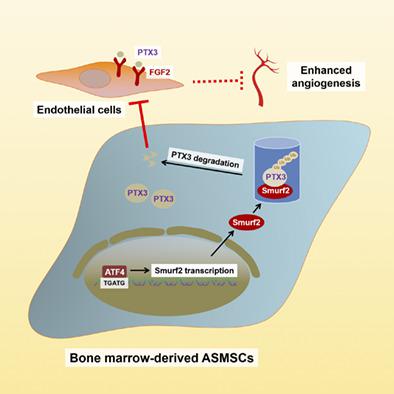当前位置:
X-MOL 学术
›
STEM CELLS
›
论文详情
Our official English website, www.x-mol.net, welcomes your
feedback! (Note: you will need to create a separate account there.)
SMAD‐specific E3 ubiquitin ligase 2 promotes angiogenesis by facilitating PTX3 degradation in MSCs from patients with ankylosing spondylitis
STEM CELLS ( IF 4.0 ) Pub Date : 2021-02-06 , DOI: 10.1002/stem.3332 Mengjun Ma 1 , Wen Yang 1 , Zhaopeng Cai 1 , Peng Wang 1 , Hongyu Li 1 , Rujia Mi 2 , Yuhang Jiang 1 , Zhongyu Xie 1 , Pengfei Sui 3 , Yanfeng Wu 2 , Huiyong Shen 1, 4
STEM CELLS ( IF 4.0 ) Pub Date : 2021-02-06 , DOI: 10.1002/stem.3332 Mengjun Ma 1 , Wen Yang 1 , Zhaopeng Cai 1 , Peng Wang 1 , Hongyu Li 1 , Rujia Mi 2 , Yuhang Jiang 1 , Zhongyu Xie 1 , Pengfei Sui 3 , Yanfeng Wu 2 , Huiyong Shen 1, 4
Affiliation

|
Dysregulated angiogenesis of mesenchymal stem cells (MSCs) is closely related to inflammation and disrupted bone metabolism in patients with various autoimmune diseases. However, the role of MSCs in the development of abnormal angiogenesis in patients with ankylosing spondylitis (AS) remains unclear. In this study, we cultured human umbilical vein endothelial cells (HUVECs) with bone marrow‐derived MSCs from patients with AS (ASMSCs) or healthy donors (HDMSCs) in vitro. Then, the cocultured HUVECs were assayed using a cell counting kit‐8 (CCK‐8) to evaluate the cell proliferation. A wound healing assay was performed to investigate cell migration, and a tube formation assay was conducted to determine the angiogenesis efficiency. ASMSCs exhibited increased angiogenesis, and increased expression of SMAD‐specific E3 ubiquitin ligase 2 (Smurf2) in MSCs was the main cause of abnormal angiogenesis in patients with AS. Downregulation of Smurf2 in ASMSCs blocked angiogenesis, whereas overexpression of Smurf2 in HDMSCs promoted angiogenesis. The pro‐angiogenic effect of Smurf2 was confirmed by the results of a Matrigel plug assay in vivo. By functioning as an E3 ubiquitin ligase in MSCs, Smurf2 regulated the levels of pentraxin 3 (PTX3), which has been shown to suppress angiogenesis through the PTX3‐fibroblast growth factor 2 pathway. Moreover, Smurf2 transcription was regulated by activating transcription factor 4‐induced endoplasmic reticulum stress. In conclusion, these results identify novel roles of Smurf2 in negatively regulating PTX3 stability and promoting angiogenesis in ASMSCs.
中文翻译:

SMAD 特异性 E3 泛素连接酶 2 通过促进强直性脊柱炎患者 MSC 中 PTX3 的降解来促进血管生成
间充质干细胞 (MSCs) 的血管生成失调与各种自身免疫性疾病患者的炎症和骨代谢紊乱密切相关。然而,MSCs 在强直性脊柱炎 (AS) 患者异常血管生成发展中的作用仍不清楚。在这项研究中,我们用来自 AS 患者 (ASMSC) 或健康供体 (HDMSC) 的骨髓来源的 MSC 在体外培养了人脐静脉内皮细胞 (HUVEC)。然后,使用细胞计数试剂盒-8 (CCK-8) 检测共培养的 HUVEC 以评估细胞增殖。进行伤口愈合试验以研究细胞迁移,并进行管形成试验以确定血管生成效率。ASMSCs 表现出增加的血管生成,MSCs 中 SMAD 特异性 E3 泛素连接酶 2(Smurf2)的表达增加是 AS 患者血管生成异常的主要原因。ASMSCs 中 Smurf2 的下调阻断了血管生成,而 HDMSCs 中 Smurf2 的过表达促进了血管生成。Smurf2 的促血管生成作用通过 体内 基质胶塞测定的结果得到证实。通过在 MSC 中作为 E3 泛素连接酶发挥作用,Smurf2 调节了五联蛋白 3 (PTX3) 的水平,PTX3 已被证明可以通过 PTX3-成纤维细胞生长因子 2 途径抑制血管生成。此外,Smurf2 转录受激活转录因子 4 诱导的内质网应激调节。总之,这些结果确定了 Smurf2 在负调节 PTX3 稳定性和促进 ASMSC 血管生成方面的新作用。
更新日期:2021-04-16
中文翻译:

SMAD 特异性 E3 泛素连接酶 2 通过促进强直性脊柱炎患者 MSC 中 PTX3 的降解来促进血管生成
间充质干细胞 (MSCs) 的血管生成失调与各种自身免疫性疾病患者的炎症和骨代谢紊乱密切相关。然而,MSCs 在强直性脊柱炎 (AS) 患者异常血管生成发展中的作用仍不清楚。在这项研究中,我们用来自 AS 患者 (ASMSC) 或健康供体 (HDMSC) 的骨髓来源的 MSC 在体外培养了人脐静脉内皮细胞 (HUVEC)。然后,使用细胞计数试剂盒-8 (CCK-8) 检测共培养的 HUVEC 以评估细胞增殖。进行伤口愈合试验以研究细胞迁移,并进行管形成试验以确定血管生成效率。ASMSCs 表现出增加的血管生成,MSCs 中 SMAD 特异性 E3 泛素连接酶 2(Smurf2)的表达增加是 AS 患者血管生成异常的主要原因。ASMSCs 中 Smurf2 的下调阻断了血管生成,而 HDMSCs 中 Smurf2 的过表达促进了血管生成。Smurf2 的促血管生成作用通过 体内 基质胶塞测定的结果得到证实。通过在 MSC 中作为 E3 泛素连接酶发挥作用,Smurf2 调节了五联蛋白 3 (PTX3) 的水平,PTX3 已被证明可以通过 PTX3-成纤维细胞生长因子 2 途径抑制血管生成。此外,Smurf2 转录受激活转录因子 4 诱导的内质网应激调节。总之,这些结果确定了 Smurf2 在负调节 PTX3 稳定性和促进 ASMSC 血管生成方面的新作用。











































 京公网安备 11010802027423号
京公网安备 11010802027423号